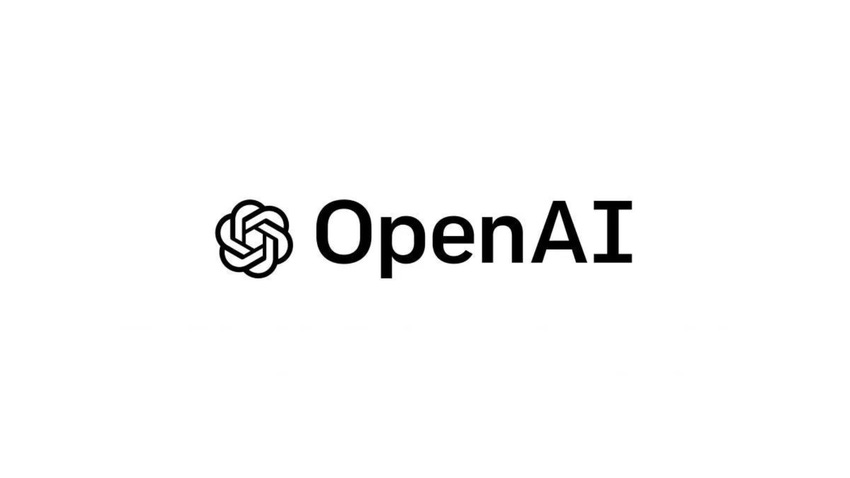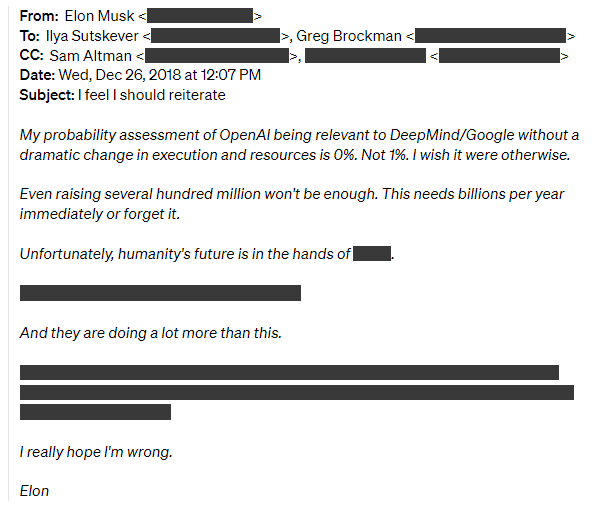OpenAI to Musk: You're Upset We Succeeded Without You
OpenAI responds to Elon Musk's lawsuit, which claims breach of the startup's founding pledge to be a nonprofit.

At a Glance
- OpenAI released emails with Musk showing that he supported their for-profit pivot and agreed some science cannot be shared.
- Musk proposed OpenAI merge into Tesla, which will fund the AI startup. Without such backing, he said OpenAI would fail.
- "Unfortunately, humanity's future is in the hands of (redacted name)," Musk wrote. "I really hope I'm wrong."
OpenAI came out fighting as it seeks a dismissal of the lawsuit brought by co-founder Elon Musk.
The ChatGPT maker published a series of emails between Musk and senior company executives in which he appears to have backed plans for the startup to pivot to a for-profit entity. Musk is suing OpenAI over claims its deal with Microsoft breached the startup’s founding agreement to remain an AI research nonprofit.
Musk co-founded OpenAI in 2015 to become a nonprofit counterweight to Google, which at the time had unparalleled AI staff and resources after buying DeepMind. Musk was worried that AI was dangerous to humanity and should not be left in the hands of a for-profit behemoth like Google.
Since then, relations between Musk and OpenAI have soured.
“We're sad that it's come to this with someone whom we’ve deeply admired — someone who inspired us to aim higher, then told us we would fail, started a competitor, and then sued us when we started making meaningful progress towards OpenAI’s mission without him,” said OpenAI CEO Sam Altman, President Greg Brockman and other senior OpenAI executives in a blog post.
Tesla merger
OpenAI rebutted Musk's claims that it violated its nonprofit founding pledge, saying that Musk knew of their plans and actually was “supportive” of OpenAI finding its own path.
An email from Musk to Brockman and Altman saw him acknowledge the need for more money to survive. “We need to go with a much bigger number than $100M to avoid sounding hopeless relative to what Google or Facebook are spending. I think we should say that we are starting with a $1 billion funding commitment. This is real. I will cover whatever anyone else doesn't provide.”
As they discussed going the for-profit route, OpenAI said Musk wanted “majority equity, initial board control and to be CEO.” When OpenAI said no to giving up too much control to one person, Musk suggested OpenAI should merge with Tesla, since starting from scratch to catch up to Google seemed unrealistic.
The merger idea, which came from a friend of Musk’s, was for Tesla to become OpenAI’s “cash cow.” Tesla would fund OpenAI’s research efforts so it did not have to focus on pleasing investors. This proposal made sense to Musk – and also gives him control over the entity.
When OpenAI rebuffed the merger idea, they said Musk left to build an AGI competitor within Tesla.
“My probability assessment of OpenAI being relevant to DeepMind/Google without a dramatic change in execution and resources is 0%. Not 1%. I wish it were otherwise,” Musk said in a December 2018 email.
“Unfortunately, humanity’s future is in the hands of (redacted name),” he wrote, before adding, “I really hope I’m wrong.”

In 2019, OpenAI found an investor – Microsoft, which put in $1 billion initially. Later, the software giant would commit a total of $13 billion to OpenAI and become its strategic partner.
While Musk originally saw Google as the biggest threat, his lawsuit claims Microsoft is OpenAI's new AI overlord, even describing GPT-4 as “a de facto Microsoft proprietary algorithm.”
Agrees to AI ‘being less open’
In another rebuke to Musk's claims, OpenAI said he “understood the mission did not imply open-sourcing AGI.”
Musk’s lawsuit demanded that OpenAI become more open with GPT-4 just like it was more transparent with its earlier language models.
But in an email exchange with OpenAI co-founder and Chief Scientist Ilya Sutskever, the apparent mastermind of November’s boardroom coup, Musk appeared to agree that moving away from an open structure might be needed.
Sutskever told Elon: “As we get closer to building AI, it will make sense to start being less open. The open in OpenAI means that everyone should benefit from the fruits of AI after its built, but it's totally OK to not share the science.”
Replied Musk: “Yup.”
Read more about:
ChatGPT / Generative AIAbout the Author(s)
You May Also Like




.jpg?width=700&auto=webp&quality=80&disable=upscale)
.jpg?width=700&auto=webp&quality=80&disable=upscale)

.jpg?width=300&auto=webp&quality=80&disable=upscale)
.jpg?width=300&auto=webp&quality=80&disable=upscale)
.jpg?width=300&auto=webp&quality=80&disable=upscale)
.jpg?width=300&auto=webp&quality=80&disable=upscale)
.jpg?width=300&auto=webp&quality=80&disable=upscale)